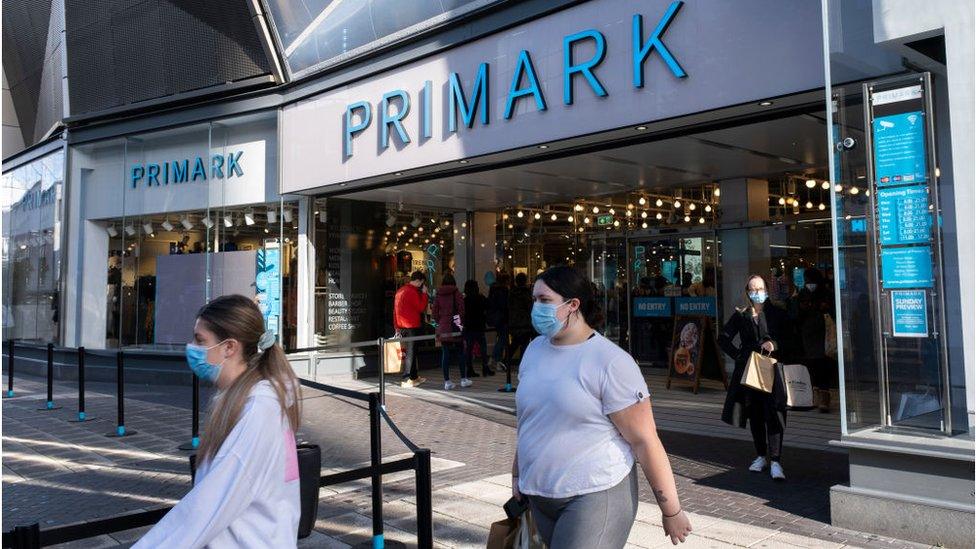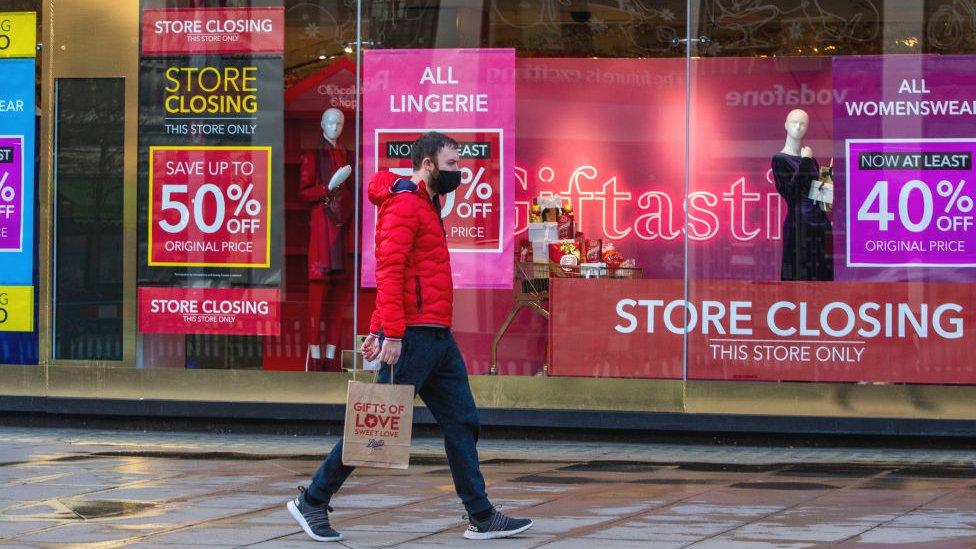Primark gears up for April reopening as sales slump
- Published
- comments

Primark stores have been hit hard by lockdown
Fast fashion chain Primark hopes to offload millions of pounds worth of last year's clothing stock when its shops reopen in England on 12 April.
The High Street giant does not offer online sales and says it expects to have lost £1.1bn in sales due to the latest lockdown closures.
It plans to sell more than £400m of last year's stock to help plug the gap.
The chain said its stores would also offer new ranges for all the new seasons, including this spring.
Primark said its 153 stores would reopen in England on 12 April, and in Scotland on 26 April.
Unlike rivals, the retailer had no online operation to shift stock when stores were closed during lockdowns.
But Primark is not set up to sell online, and has said the costs involved in distribution and sales online would mean price rises for customers.
Primark's £1.1bn sales drop contrasts with online only fashion retailers such as Asos and Boohoo, whose sales rose by around 40% in the last four months of 2020.
Sales gap
Primark owner Associated British Foods said sales for the 24 weeks to 27 February 2021 were £2.2bn, compared to £3.7bn in the same period last year, as lockdowns and closures in the UK and Europe stopped people going to many High Street shops.
Its stores have been closed in many countries across Europe, including Germany and the Netherlands.
It has dates for reopening shops in those countries, but still does not know when it will reopen in Wales, the Republic of Ireland and Portugal.
However, it is optimistic that customers will return to all of its stores as soon as they reopen: "We know that people will welcome us back when we reopen," finance chief John Bason said. "There is pent-up demand."
It will be selling a mix of new and old lines for the remainder of the year as it plays catch-up.
When stores reopen Primark expects to sell £150m of spring and summer lines that were stored in warehouses from last year. It then aims to sell £260m of autumn and winter stock such as jeans and jumpers next season.
This is unusual in the fashion world, where unsold stock is usually sold off in end-of-season sales, and has in the past even been burnt or sent to landfill, to make space for new ranges.
Primark says it does not burn or bin any unsold stock but instead normally donates it to charity.
Sophie Lund-Yates, equity analyst at Hargreaves Lansdown, said the closures of the Primark estate were "costing a pretty penny".
"However, the retail chain is a force to be reckoned with," she said. "When previous lockdowns ended we saw demand rebounded strongly."
While sales were down 15% in the last round of reopening, which "sounds bad", "in reality that's an impressive recovery when you consider people had little reason to visit the High Street, and Primark's lack of online business".
"Even more importantly, so strong is the demand for Primark's clothes, excess inventory has been less of a problem during the pandemic, because more of it flies off the shelf than expected once the doors open," she said.
Why won't Primark sell online?
In the past Primark has said it won't sell online because the cost of manning the operation and processing high volumes of returns would mean it could no longer offer low prices.
Being in fast fashion means it has low margins, so "they have to be very competitive on price," Patrick O'Brien, UK retail research director at GlobalData told the BBC in January.
Online players like Asos and Boohoo were "geared up for it in terms of logistics".
"But Primark would be starting from scratch, and would have to integrate any new online operation with its existing store structure which would be costly."
However Retail Economics' Richard Lim said Primark was at risk of "potentially alienating its customers" who increasingly expect to be able to shop online.
Customers would be finding new ways of shopping with rivals, he said.
'Changing habits'
Primark's performance meant owner-Associated British Foods' first half sales and earnings would be lower than the previous year, the company said.
But Associated British Foods has a grocery division, with brands that include Kingsmill bread, Twinings tea and Ovaltine, as well as major sugar, agriculture and ingredients businesses.
These fared well as people stocked up during lockdown.
Richard Hunter, head of markets at Interactive Investor, said: "Primark store closures are inevitably punching a hole in profits, but the diversified nature of the business is serving AB Foods well.
"Changing habits arising from the pandemic have boosted other parts of the business."
- Published19 February 2021

- Published2 February 2021

- Published21 January 2021
